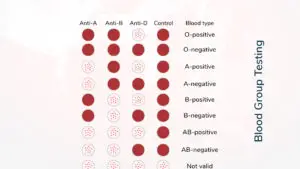What Are Blood Types?
A vital component of medical diagnostics, blood testing aids in the understanding of a wide range of medical disorders, directs treatment regimens and guarantees the safety of medical procedures like blood transfusions. Providing thorough blood testing services to keep you informed about your health is our top priority at IV Lounge. Knowing the Rh factor and blood types is a basic component of blood testing. In this blog, we’ll cover the fundamentals of blood kinds, the importance of the Rh factor, and the reasons why understanding this knowledge is critical to your health.
Blood types used in humans depend on certain antigens on red blood cells. The ABO system, which categorizes blood into four main blood types: A, B, AB, and O, is the most used blood grouping technique. The presence of A and B antigens distinguishes these types.
Type A: Red blood cells have A antigens. Plasma has anti-B antibodies.
Type B: Red blood cells have B antigens. Plasma has anti-A antibodies.
Type AB: Type AB is the universal receiver. Its red blood cells have both A and B antigens. They lack anti-A and anti-B antibodies in the plasma.
Type O: This universal donor has anti-A and anti-B antibodies in his plasma. His red blood cells lack A and B antigens.
The Importance Of Blood Types
Knowing your blood type is important for several reasons:
Blood transfusion: It’s important to match donor and recipient blood. This minimizes unwanted reactions. Blood clots are the only serious side effect of blood transfusion incompatibility.
Pregnancy: Mother and unborn child may be exposed to blood. If a woman with type O blood gives birth to a child with type A or B blood, her immune system produces antibodies. These antibodies target the child’s red blood cells.
Medical treatments: Some medical problems and treatments, like organ transplants, require a compatible blood type. It must be safe.

What Is The Rh Factor?
The Rh factor, often known as the Rhesus factor, is another important Rh blood type component. It indicates if a specific antigen, the D antigen, is present or not on the surface of red blood cells. If the D antigen is present, blood is categorised as Rh-positive (Rh+). Otherwise, it is Rh-negative (Rh-).
Rh blood type combination combining the Rh and ABO blood types can result in eight distinct blood types:
A+ (A positive)
A- (A negative)
B+ (B positive)
B- (B negative)
AB+ (AB positive)
AB- (AB negative)
O+ (O positive)
O- (O negative)
The Significance Of Rh Factor
The Rh factor is very important in the following situations.
Blood transfusions: Match Rh factor transfusions to minimize complications from ABO patterns.
Pregnancy: Rh incompatibility occurs when a Rh-negative mother carries a Rh-positive baby. The mother may develop antibodies against the baby’s Rh-positive blood cells. This can cause hemolytic disease in the newborn (HDN), which is potentially fatal and can harm the baby.
Health risks: The Rh factor can affect disease risk and treatment. It matters in blood transfusions and pregnancy.
Blood Tests For Determining Blood Type And Rh Factor
You can quickly and accurately test your blood types and Rh factor with a blood test. The following is what you should expect from a blood test.
Sample Collection: A medical practitioner will take a little blood sample from you, generally from an arm vein.
Laboratory Analysis: An examination is performed on the blood sample by technicians to determine if the Rh factor and the A and B antigens are present.
Results: Your ABO blood type (A, B, AB, or O) and Rh status (positive or negative) will be shown in the findings.

Does Knowing Your Blood Type And Rh Factor Matter?
Knowing your Rh factor and blood types can have a huge impact on your health and healing:
Emergency situation: In an emergency, knowing your blood and Rh blood type can help. It ensures you get the right blood supply quickly if you need a transfusion.
Pregnancy and family planning: Know your blood and Rh status. It will help protect your health and your unborn baby. It will address any potential Rh incompatibility problems.
Medical records: Your blood type and Rh status are on file. This helps your healthcare professional to safely and effectively hurry treatments and procedures.
The Future Of Blood Typing And Rh Factor Testing
New medical technology has improved blood quality and Rh factor testing. They are now more accurate and effective. New techniques, like molecular blood testing, will improve blood transfusions. They will make them safer and more effective. The tests will provide accurate results and may identify rare blood types.
Let’s Sum Up
Maintaining your health and obtaining safe medical treatment requires you to be aware of your blood type and Rh factor. The professionals at IV Therapy are dedicated to providing thorough and precise blood testing services so you may continue to be educated and proactive about your health. Our qualified staff is available to help, whether you need to know your blood type for peace of mind, a medical treatment, or pregnancy planning.
You can make better decisions about your health and be more equipped to handle any medical emergency if you take the time to learn about your blood type and Rh factor through our Blood Panel. Make an appointment for your blood test with IV Lounge right now to start along the path to better health in the future.
Common Questions About Blood Types And Rh Factor
- Can blood type change over time?
No. Genetics determines your blood pressure, which remains consistent throughout your life. Some diseases or treatments can change your blood pressure. Bone marrow transplants are one example.
- Is one blood type more common than others?
Yes, some blood types are more prevalent in particular groups of people. For instance, type AB blood is the rarest in the world, but type O is the most prevalent.
- Can diet or lifestyle influence blood type?
No, your blood is natural and not affected by lifestyle or diet. A healthy lifestyle can boost your health, no matter your blood type.
- How often should I get my blood type tested?
Usually, one blood test is enough. If you’ve had surgery or treatment, that may change. But, it is advisable to let your healthcare provider know your blood type and let him or her get closer.










